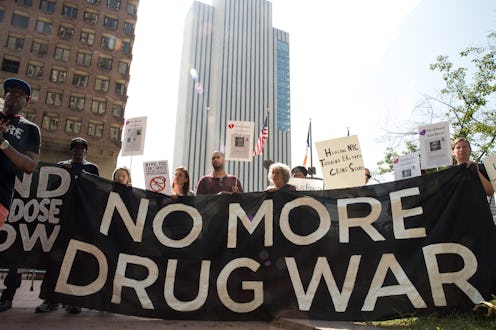
In the spring, the Massachusetts Supreme Judicial Court is expected to rule on whether or not it's constitutional to require a person on probation to remain drug-free. Specifically, the case before the court asks whether a person who is addicted to drugs, in this case opioids, can be punished for failing to stay sober.
Julie Eldred, a woman from Acton, Massachusetts, is the person at the crux of the situation. Back in 2016, she was put on a year of probation for a larceny charge. (Larceny, for background, is the theft of personal property.)
Eldred had reportedly struggled with drug addiction for years. At the time, she was still using, she told NPR. But, given the option to adhere to probation conditions or else go to prison, Eldred opted to meet the requirements handed down to her. So, she said she began ticking off a to-do list of expectations set by the court.
Some of her probation conditions specifically required her to seek addiction treatment. According to NPR, Eldred obtained outpatient treatment, medication, and a therapist. But only 12 days into her probation, she reportedly failed a drug test, coming up positive for the opiate fentanyl.
As Eldred explains it, her probation officer didn't consider her situation subjectively.
"She didn't look [to see] that I had just gotten started getting everything in order," Eldred told NPR. "She just saw that I had a 'dirty urine,' and she just sent me in front of the judge to go to jail."
She is now reportedly arguing that the courts requiring her to remain drug-free violates her constitutional rights because her addiction makes it almost impossible to guarantee. The question at the heart of the case, at is stands now, is whether or not sending someone who is addicted to substances to prison for returning to those substances is reasonable and/or legal. Eldred's attorney, Lisa Newman-Polk, argues that the tactic is ineffective in treating addiction and preventing relapse.
Opponents, however, disagree. They would argue that not wanting to be imprisoned provides incentive for addicts to cease substance abuse, and that further, addiction is not necessarily a disease.
Dr. Steve Sussman, a professor of preventive medicine, psychology, and social work at the University of Southern California, tells Bustle that very little is so cut and dry when it comes to addiction, including the contested term of "disease."
"If you call something a disease, it could be a disease or it might not be a disease," he says. Medical conditions are subject to re-classification, he explains: "Alcoholism was considered a personality disorder but eventually it changed. It became autonomous."
There are similarities among many people who have substance abuse addictions, but it's difficult to nail down anything that is a bottom-line commonality, aside from the drug dependency itself.
"The key thing about an addiction of any kind is that a person is trying to feel comfortable in their own skin," Sussman says. "They're trying to get ... a period that feels satiated."
The case before the Massachusetts court cannot reasonably decide whether or not addiction is or isn't a disease, but both sides reportedly reference the science being considered.
One tactic that could be helpful in situations like this, Sussman says, is instituting an action plan that the person in question could utilize if he or she feels that they are going to relapse. This could include a number to call or a place to go to when staying clean is feeling impossible. Speaking broadly of anyone in similar situations, Sussman described the challenging nature of asking someone with an addiction to simply stay clean.
"At minimum, you have to acknowledge that that's a very difficult thing for someone to pull off," Sussman says.
Since addiction is such a subjective experience, prone to an endless list of personal variables, Sussman suggests that a more individualized approach could be helpful. If, for instance, someone is very recently using or is in the helm of a relapse, he says that perhaps instead of probation, that person should be put in an inpatient program.
Relapse rates are high across the board. Estimates suggest that approximately 66 percent of those with addictions relapse after pursuing treatment. With this in mind, it's important to consider that prolonged drug use can alter a person's brain, and those changes can last for years, Sussman says. It should go without saying, but because a person is experiencing addiction doesn't mean that the individual wants to be addicted.
"The majority of people with addictions, they don't want to be a danger to self or others," Sussman says. "They don't want to be drinking or using; they want to be good people like everyone else, and they're struggling."